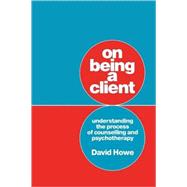On Being a Client : Understanding the Process of Counselling and Psychotherapy
, by David Howe- ISBN: 9780803988897 | 0803988893
- Cover: Paperback
- Copyright: 8/30/1993
'This book explores what clients have to say about their experience of the psychotherapeutic process. David Howe observes that, regardless of the therapist's theoretical orientation, clients say similar things about their experience of being helped (and not being helped). It is the non-specifics of genuineness, a secure trusting atmosphere, empathy and warmth that offer the vehicle for encouraging a dialogue of personal intimate material, and of "making sense" and understanding when we are in pain, puzzled or worried.... This is an easy and gentle read.... For those interested in Attachment Theory, this would be a useful addition to their bookshelf' - Clinical Psychology ForumThere is a growing interest in what clients have to say about their experiences of counselling and psychotherapy. In a powerful analysis of this subject, David Howe identifies a number of clear and potent messages. He explores such questions as why clients say the things they say and why the therapeutic alliance holds out such promise, and, using the client's experience as a platform, seeks to create a general theory of counselling and psychotherapy.The author draws on a number of new and exciting ideas emerging in developmental psychology, sociology and the brain sciences to discuss the process by which the human infant becomes an individual as well as a competent social being. From the basis that the social and psychological structures which generate the client's experience underlie all psychotherapeutic encounters, the book then explores how the self forms and then re-forms in social relationships, including those established during counselling and psychotherapy. In conclusion, the reader is invited to consider a number of thought-provoking claims about the universal qualities that characterize good and bad practice in all schools of counselling, therapy and the helping process.






